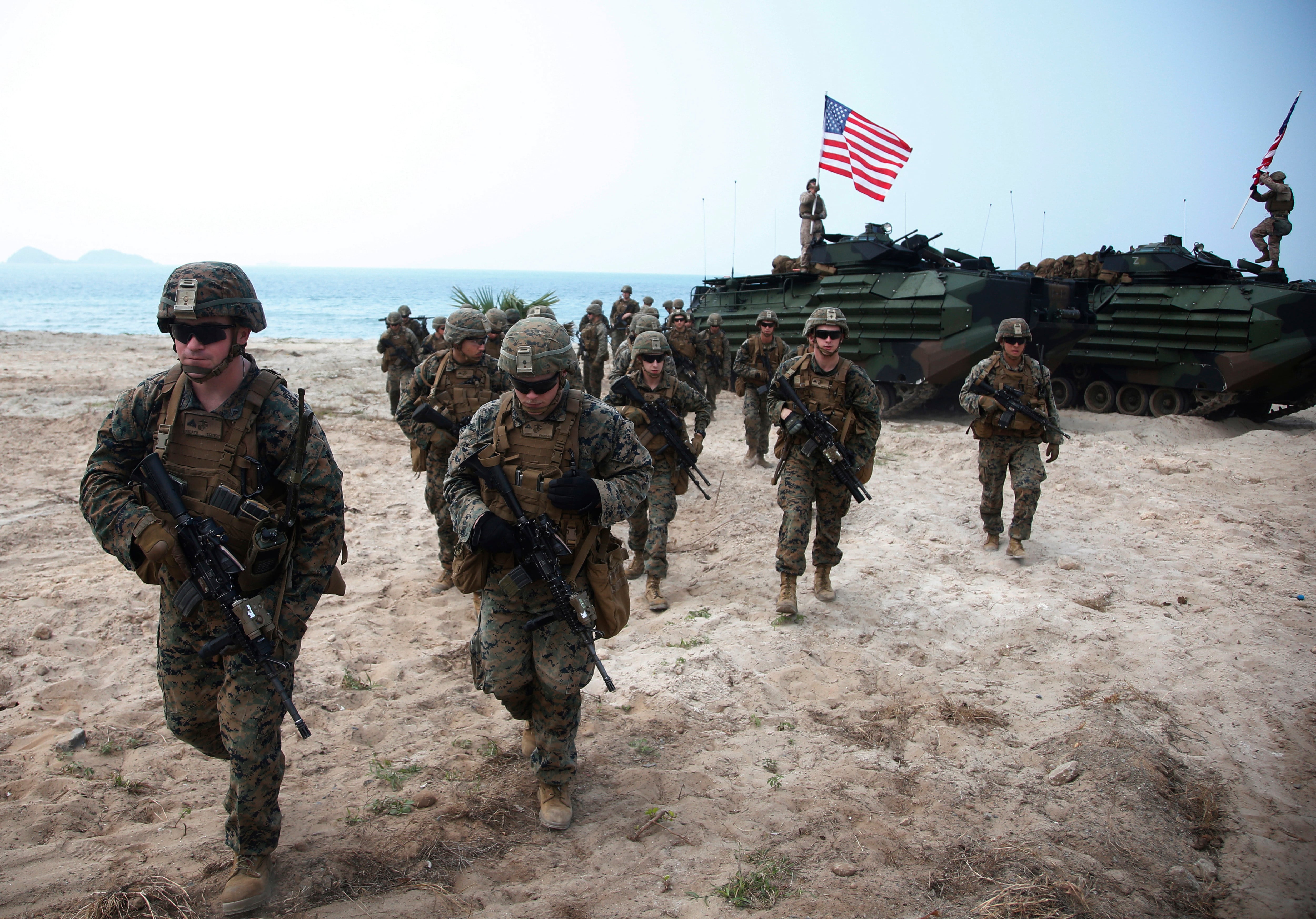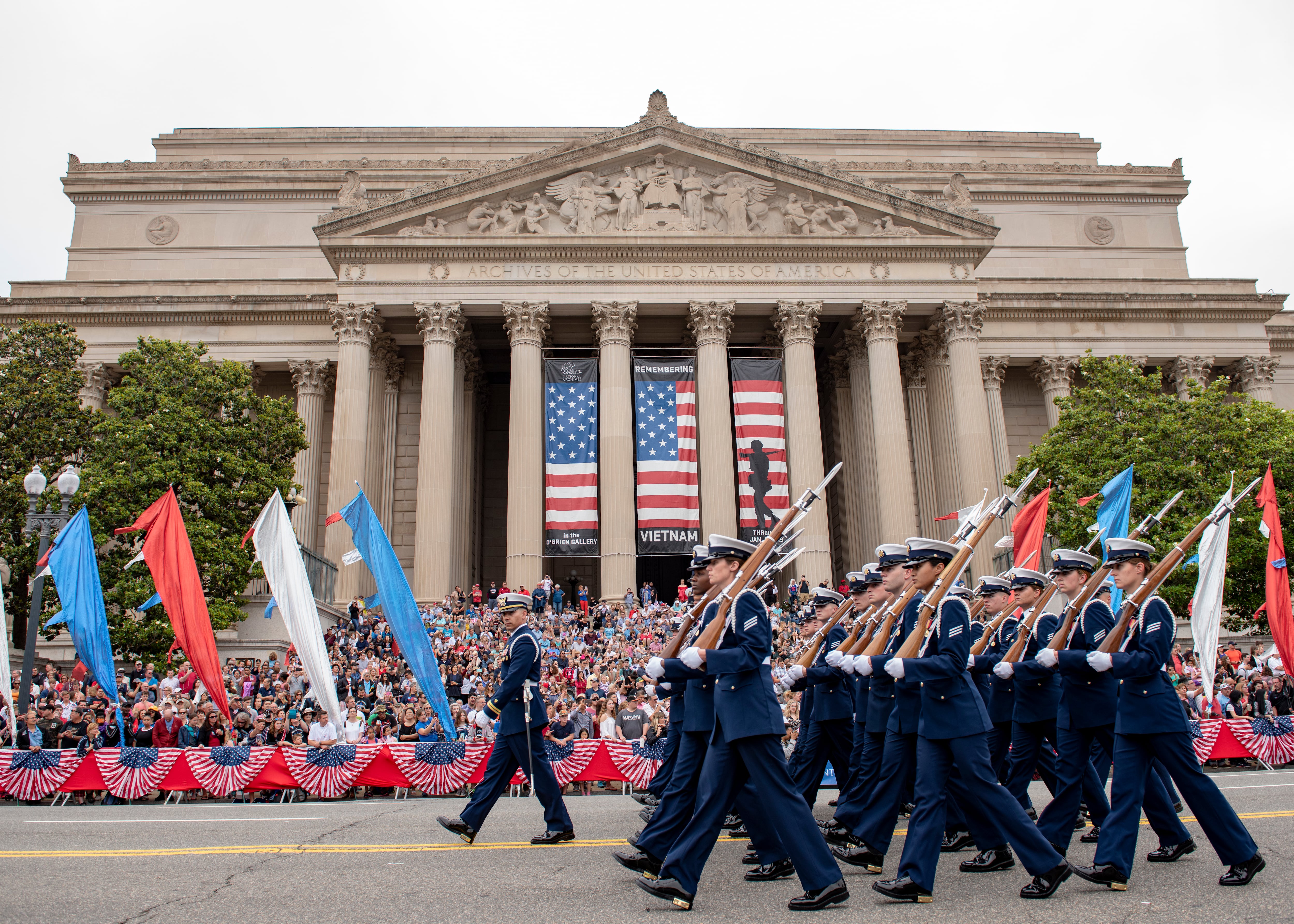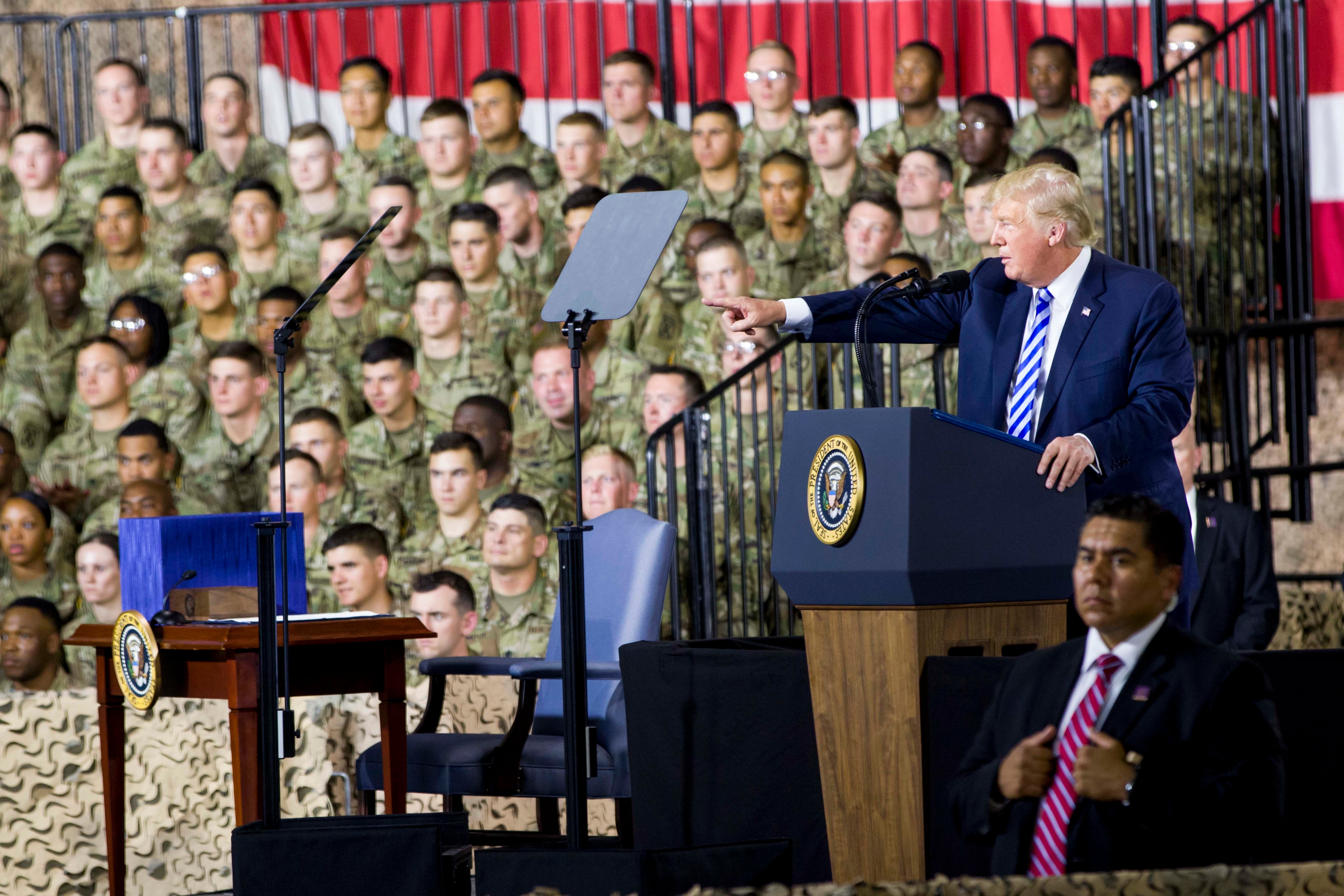WASHINGTON — For months, President Donald Trump’s campaign trail speeches have included the same version of the same applause line on national security.
“Our military will soon be more powerful than it ever has been ever, ever, ever before,” the president said at an event in Nevada a week ago. “Under Republican leadership, America is booming, America is thriving, and America is winning, because we are finally putting America first.”
Democrats’ defense policies, he insists, “are against your military.”
The Democratic National Committee’s actual platform on national security says party members “are committed to ensuring our troops have the training, equipment, and support that they need when they are deployed and the care that they and their families need and deserve when they return home.”
But beyond those high-level feuds, the debate on national security issues has been more muted this year than in the 2016 election, when military and defense topics were center stage in the presidential campaign. Without a central Democratic figure like Trump stumping on national defense, the military has only played a significant factor only in races with bases or large defense contractors.
RELATED

“At the end of the day (the election) comes down to the economy, whether or not people can pay their bills,” said Sen. Thom Tillis, R-N.C., and chair of the Senate Armed Services Personnel Subcommittee, in an interview earlier month.
“National security, when you had the rise of ISIS, it probably spiked. But generally speaking, it’s not on the top five list. It is on mine.”
Two years ago, officials from the Gallup Poll reported that about 11 percent of voters listed national security and terrorism as the most important problems facing the United States. In the most recent survey of that question, it dropped to 2 percent.
Dissatisfaction with the federal government and the national economy stand at the top of voters concerns. The irony is that candidates’ stance on military issues will directly affect those other priorities in Congress’ next session.
If Democrats take control over either chamber, the defense budget is likely to be one of the primary fights between the two parties, with the possibility of a government shutdown (and related economic impacts) hanging over much of the year.
“Is it an issue that’s well understood outside the Beltway? Probably not,” said Susanna Blume, a senior defense fellow at the Center for a New American Security. “But the defense budget could very well return Congress to the gridlock and last-minute negotiations that we’ve seen in prior years.”
Where defense is the debate
Ohio Sen. Sherrod Brown — one of 23 Democratic senators running for re-election — said voters in recent months have approached him about Russian interference in U.S. elections and broader concerns about terrorism. But in general, national security “doesn’t seem to be the voting issue it might have been in other years.”
Where it does make a big difference in his campaign is jobs.
Brown’s state includes Wright-Patterson Air Force Base, Ohio’s largest single site employer with a military and civilian workforce of 22,000; a Boeing facility working on the navigation system of the Trident II D5 submarine-launched nuclear missile; and an Army plant that assembles the MIA2 Abrams tank.
“I’ve been involved in saving a good many defense jobs in Cleveland and Columbus and Lima,” Brown said. “It’s not so macro, how you voted for defense spending overall — and we all pretty much did — it’s how did you respond to local concerns.”
Similarly, Rep. Martha Roby, R-Ala. and a member of the House Appropriations Committee, has featured her advocacy for funding of Fort Rucker and Maxwell Air Force Base programs in her re-election push.
Rep. John Carter, R-Texas, recently unveiled a radio ad the former commander of Fort Hood extolling Carter’s work getting funding for “a massive barracks and motor pool upgrade so necessary to readiness to the force.”
In Virginia, home to 26 military bases and shipyards, national security and job security go hand-in-hand. Democratic Sen. Tim Kaine’s re-election ads tout his support for a troop pay increase and a 355-ship Navy — both priorities of the Trump administration.
But Kaine’s GOP opponent, Corey Stewart, has targeted the same military issues. Both candidates have accused the other of voting against critical defense funding bills.
RELATED

While one Democrat is touting his support for defense spending, another Democrat on the other side of the country is touting his votes against it.
Rep. Adam Smith, D-Wash., and ranking member of the House Armed Services Committee, has been forced to defend his military support because of a midterm challenge from a 30-year-old democratic socialist who has cast herself as the “anti-war candidate.”
In a debate between the two earlier this month, Sarah Smith questioned why the country was spending so much on the military and not enough on domestic priorities — a balance Rep. Smith frequently questions himself. She attacked U.S. intervention in Iraq, a vote Rep. Smith has said he regrets.
And she blasted the incumbent lawmaker for accepting big corporate donations from the defense industry. Smith, whose district abuts Joint Base Lewis-McChord and is close to Boeing facilities, said he has not been pressured by the contractor lobby, but is open to their perspective, too.
“When it comes to the armed services committee, as much as I disagree with Boeing — I get into fights with them all the time — I listen to them,” Smith said. “I do not believe that corporations are evil.”
RELATED

Immigration as defense?
While national defense has waned as a national election topic in recent months, immigration concerns have risen. The latest Gallup poll shows that as the third most pressing national problem on voters’ minds.
This week, that issue again intersected with the military. The Pentagon unveiled Thursday plans to send 800 troops to the southern U.S. border to help border patrol members deal with the expected arrival of a caravan of migrants from Central America in coming weeks.
In recent days, Trump has repeatedly promised to use the military to deal with the immigration issue, accusing Democrats of undermining national security by refusing to fund his plans for a wall along the U.S. and Mexican border.
The move could bring the armed forces to the forefront of the last days of the midterm campaign, as candidates weigh in on the Pentagon moves. But the number of troops there still pales in comparison to those deployed overseas in Iraq, Afghanistan and other unstable areas.
“Wait to see what happens over the next couple of weeks,” Trump said to a campaign rally in Wisconsin Wednesday night. “You’re going to see a very secure border. Just watch. And the military is ready, they're all set. They’re all ready and there's nobody like them.”
The midterm election is Nov. 6.
Leo covers Congress, Veterans Affairs and the White House for Military Times. He has covered Washington, D.C. since 2004, focusing on military personnel and veterans policies. His work has earned numerous honors, including a 2009 Polk award, a 2010 National Headliner Award, the IAVA Leadership in Journalism award and the VFW News Media award.
Joe Gould was the senior Pentagon reporter for Defense News, covering the intersection of national security policy, politics and the defense industry. He had previously served as Congress reporter.




